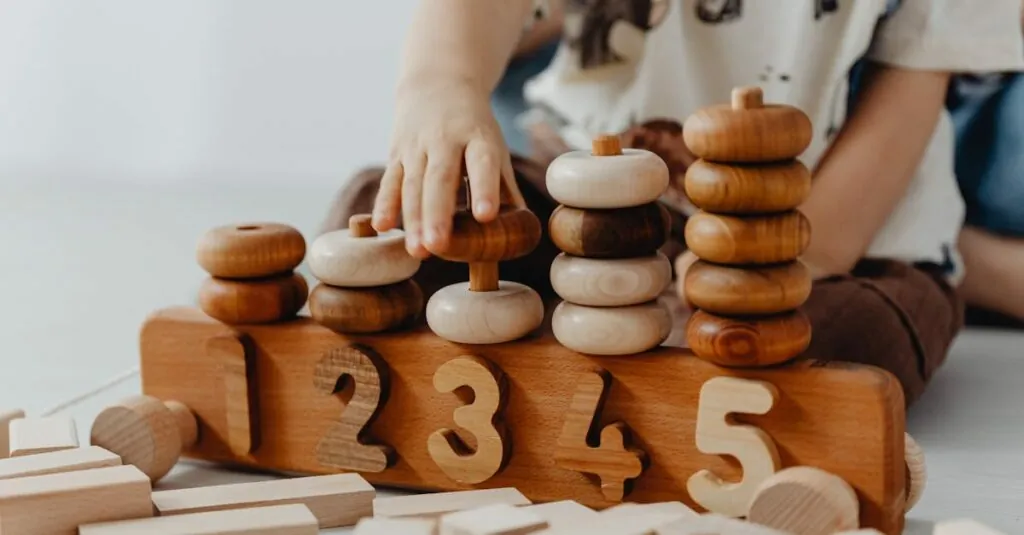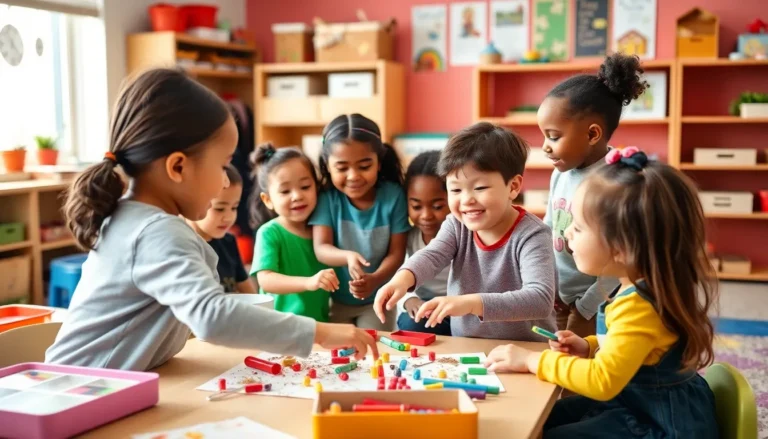Table of Contents
ToggleIn a world where toddlers seem to have boundless energy and an unquenchable thirst for discovery, finding the perfect activities can feel like searching for a needle in a haystack. Enter Montessori! This educational approach transforms everyday moments into engaging learning experiences. Who knew that pouring water could be a lesson in physics or that sorting toys could spark a love for math?
Understanding Montessori Education
Montessori education emphasizes child-led learning. It encourages exploration and independence through hands-on activities.
Principles of Montessori Learning
Children learn best through experiences. Montessori education nurtures this belief by allowing kids to interact with their environment. Freedom of choice exists within a structured framework, promoting self-discipline. Each child’s unique pace and interests shape their learning journey. Materials are designed to be self-correcting, fostering problem-solving skills independently. Respect for each child as an individual drives the philosophy forward.
Benefits of Montessori for Toddlers
Montessori activities enhance cognitive development in toddlers. Skills such as concentration and coordination improve through purposeful play. Social interactions in mixed-age settings boost communication skills and empathy. Emotional growth thrives in environments that empower self-regulation. Montessori education also lays the foundation for lifelong learning, instilling a sense of curiosity and love for knowledge. Engaged toddlers exhibit increased confidence as they master new skills and challenges.
Essential Toddler Montessori Activities
Montessori activities for toddlers focus on hands-on experiences that encourage independence and learning. Exploring practical life, sensorial, language development, and math activities fosters essential skills.
Practical Life Activities
Practical life activities involve everyday tasks that develop fine motor skills and self-control. Pouring water into cups or transferring beans with spoons enhances coordination. Toddlers thrive when engaged in activities like buttoning, zipping, or sweeping, as these tasks give them a sense of responsibility. Engaging in gardening teaches patience and an appreciation for nature. Each activity nurtures their confidence while they explore their environment.
Sensorial Activities
Sensorial activities cultivate awareness through exploration of the senses. Engaging with materials like textured fabric helps toddlers differentiate colors and shapes. Activities involving sound jars allow them to identify various sounds, sharpening auditory skills. Using smell bottles to detect different scents adds another layer of discovery. Such experiences promote critical thinking and observation while refining sensory perception. Each step they take into a sensory-rich environment boosts cognitive development.
Language Development Activities
Language development activities emphasize vocabulary expansion and communication skills. Reading picture books aloud fosters interest in stories and language. Introducing letter sounds with sandpaper letters makes learning engaging. Singing songs and rhymes promote phonemic awareness while encouraging verbal expression. Toddlers benefit from conversations to articulate thoughts and emotions. Listening activities help them develop comprehension and vocabulary. Each session lays a strong foundation for literacy skills.
Math Activities
Math activities introduce toddlers to basic mathematical concepts through hands-on exploration. Sorting and counting objects like blocks or buttons reinforce number recognition. Using measuring cups during water play promotes understanding of volume and size. Activities involving patterns with colored cubes or beads develop logical thinking. Engaging with numbers in playful contexts nurtures interest in math. Each interaction prepares toddlers for more complex mathematical concepts in the future.
Creating a Montessori Environment at Home
Creating a conducive Montessori environment at home involves specific strategies that facilitate learning. It encourages exploration, independence, and active engagement with the world.
Setting Up Learning Spaces
An effective learning space promotes freedom and simplicity. Designate areas for various activities, such as reading, art, and practical life tasks. Arrange furniture at toddler height, allowing easy access to materials. Use natural light and soft colors to create a calming atmosphere. Include open shelving to display learning resources, fostering independence and organization. Ensure each area is inviting, encouraging toddlers to explore freely. Clear pathways support movement and exploration, while soft rugs provide comfortable zones for play.
Choosing Appropriate Materials
Selecting suitable materials is crucial for Montessori activities. Opt for high-quality, durable items made from natural materials, such as wood and metal. Include tools that promote independence, like kid-sized utensils for practical tasks. Choose toys that stimulate creativity and problem-solving skills, such as blocks, puzzles, and art supplies. Focus on items that appeal to the senses, enhancing exploration and discovery. Ensure educational materials align with toddlers’ interests and developmental stages, fostering engagement and motivation to learn. Small, manageable sets encourage toddlers to concentrate and explore deeply, making the learning experience meaningful.
Tips for Engaging Your Toddler
Engaging a toddler involves keen observation and encouraging independence. Consider the following strategies for effective interaction.
Observing and Following Your Child’s Interests
Pay attention to what excites your toddler. When engaging in activities, their natural curiosity guides learning. Use their interests to shape activities. If a child enjoys animals, incorporate toys or books about them. Explore nature activities like observing insects, which can deepen their connection to the world. By following their lead, learning remains fun and meaningful for both child and caregiver. Allow them to experiment freely, leading to enriched experiences and understanding.
Encouraging Independence and Choice
Allowing toddlers to make choices fosters confidence. Provide options during activities, such as selecting colors or types of materials. When she selects her preferred tools, she feels empowered. Encourage small tasks, like dressing themselves or pouring water, to develop skills and enhance self-control. Create a routine that offers variety while remaining consistent. Establish designated spaces for activities, which promotes familiarity and comfort. Independence encourages problem-solving and strong decision-making, essential for lifelong learning and development.
Embracing Montessori activities for toddlers opens up a world of exploration and discovery. By integrating hands-on experiences into daily routines, caregivers can nurture essential skills while fostering independence and confidence. Creating a thoughtfully arranged environment encourages toddlers to engage with their surroundings, enhancing their learning journey.
As they participate in practical life, sensorial, language, and math activities, toddlers develop a strong foundation for future growth. Observing their interests and allowing them the freedom to choose activities not only keeps learning enjoyable but also empowers them to take charge of their education. Adopting these principles can lead to a more enriching and fulfilling experience for both toddlers and their caregivers.








